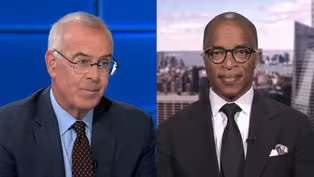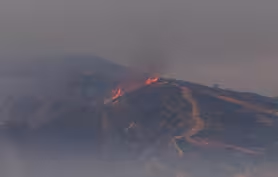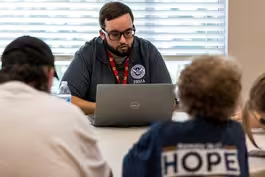
How Trump's census plan could reshape congressional maps
Clip: 8/8/2025 | 4m 48sVideo has Closed Captions
How Trump's census plan could reshape congressional maps
President Trump’s call to exclude those without legal status from the census could reshape the country’s congressional districts. But opponents argue that it would violate the 14th Amendment’s requirement that the allocation of congressional seats be determined by “counting the whole number of persons in each state.” John Yang explores what Trump hopes to achieve with NPR's Hansi Lo Wang.
Problems playing video? | Closed Captioning Feedback
Problems playing video? | Closed Captioning Feedback
Major corporate funding for the PBS News Hour is provided by BDO, BNSF, Consumer Cellular, American Cruise Lines, and Raymond James. Funding for the PBS NewsHour Weekend is provided by...

How Trump's census plan could reshape congressional maps
Clip: 8/8/2025 | 4m 48sVideo has Closed Captions
President Trump’s call to exclude those without legal status from the census could reshape the country’s congressional districts. But opponents argue that it would violate the 14th Amendment’s requirement that the allocation of congressional seats be determined by “counting the whole number of persons in each state.” John Yang explores what Trump hopes to achieve with NPR's Hansi Lo Wang.
Problems playing video? | Closed Captioning Feedback
How to Watch PBS News Hour
PBS News Hour is available to stream on pbs.org and the free PBS App, available on iPhone, Apple TV, Android TV, Android smartphones, Amazon Fire TV, Amazon Fire Tablet, Roku, Samsung Smart TV, and Vizio.
Providing Support for PBS.org
Learn Moreabout PBS online sponsorshipGEOFF BENNETT: President Trump's call for a new census is foreshadowing a potential constitutional clash.
The pronouncement came in a social media post, in which he added that -- quote -- "People who are in our country illegally will not be counted."
John Yang explores what the president hopes to achieve and how his requested recount aligns with another of his priorities, redrawing congressional maps.
JOHN YANG: Geoff, excluding those without legal status from the census would mean millions of people living in America go uncounted, reshaping the contours of the country's congressional districts.
Opponents argue that it would violate the 14th Amendment's requirement that the allocation of congressional seats be determined by counting the whole number of persons in each state.
Hansi Lo Wang covers the census for NPR.
Hansi, the Constitution makes the census a congressional responsibility.
How much say does a president have?
HANSI LO WANG, NPR: The president has some say that Congress could delegate to his administration and what the commerce secretary, who oversees the Census Bureau that has to carry out the census.
This is codified in federal law.
But, like you said, I think we have to go back to Article I of the Constitution gives ultimate authority over the census to Congress.
Congress has passed laws with directions on how presidential administrations should carry out censuses.
JOHN YANG: And how might -- using the authority that they do have, how might the Trump administration try to get around that the congressional requirement?
HANSI LO WANG: There is a federal law that says there could be a mid-decade census, but a lot of caveats to put there.
It's a mid-decade census that right now that's really outside the time frame that can't really be carried out at this point.
But there is a bill that President Trump says he supports.
It's a bill, a proposal by Republican Representative Marjorie Taylor Greene.
And this bill would exclude any U.S. resident without citizenship, so not just the people without legal status that President Trump is calling for to be excluded.
And it would also call for a new census, a new round of redistribution of House seats, and a new round of congressional redistricting all before the 2026 midterm election.
JOHN YANG: Redistricting and reallocation is a long process.
Would there be enough time to do this in time for ballots to be printed, for election officials to be ready for the 2026 midterms?
HANSI LO WANG: The census experts I talk to say no, not the kind of census that most of us are used to, which is, like you said, there are paper forms.
There's door-knocking.
It's a months-long process to do the counting because you are trying to count every person living in the country.
It's a big country.
There's a lot of people.
And it usually takes more than a decade of planning, of research, of testing.
It sounds impossible to a lot of census experts to have that kind of a census before the midterm election next year.
JOHN YANG: How does this fit in with the Republican strategy of getting Republican states to redraw the districts now to try to pick up seats in the House?
HANSI LO WANG: It's really not clear.
I think we should go back to what President Trump has said so far, calling for a new census.
We're not sure if he's talking about the 2030 census.
We're not sure if he's talking about the census before a 2026 midterm election that Representative Greene is calling for.
And so there's a lot of confusion there, a lot of questions.
But it is happening at the same time, this call for a new census, as well as this push in Texas, as well as other states, to redraw congressional maps.
And if there were to be a new census, there would be a lot of legal questions.
There will be lawsuits.
But it would theoretically come up with a new set of numbers that could theoretically shift congressional seats among the states.
But there are a lot of legal hurdles, there are a lot of practical hurdles that have to be overcome before we even get to those type of -- to get to that point.
JOHN YANG: Do we know which party would benefit if you exclude people not in the country legally?
HANSI LO WANG: One thing to keep in mind is that the formula used to redistribute House seats is a very sensitive formula.
Small changes in populations can make a difference between whether that last seat, those last two seats go to this state or the other state.
And so with so many changes in immigration patterns, with increased immigration enforcement, it's hard to predict by the time there is a census what the country, what those dynamics look like.
And so it's really hard to say.
JOHN YANG: Hansi Lo Wang of NPR, thank you very much.
HANSI LO WANG: You're welcome.
Brooks and Capehart on Israel's plans to control Gaza
Video has Closed Captions
Clip: 8/8/2025 | 10m 3s | Brooks and Capehart on Israel's plans to exert more control over Gaza (10m 3s)
Gaza takeover won't end Hamas influence, Mideast expert says
Video has Closed Captions
Clip: 8/8/2025 | 5m 41s | Netanyahu's Gaza takeover won't end Hamas influence in the region, Mideast analyst says (5m 41s)
Israel decides to take Gaza City, sparking condemnation
Video has Closed Captions
Clip: 8/8/2025 | 4m | Israel's government decides to take Gaza City, sparking condemnation and protests (4m)
News Wrap: Thousands flee fire in mountains near LA
Video has Closed Captions
Clip: 8/8/2025 | 5m 56s | News Wrap: Thousands forced to flee Canyon Fire in mountains near LA (5m 56s)
Recent natural disasters highlight Trump's changes to FEMA
Video has Closed Captions
Clip: 8/8/2025 | 6m 31s | Federal response to recent disasters reveals impact of Trump's changes to FEMA (6m 31s)
Scientists face ecological, economic hurdles to save delta
Video has Closed Captions
Clip: 8/8/2025 | 8m 24s | Scientists face ecological and economic hurdles to save Mississippi River Delta (8m 24s)
Trump to meet with Putin for talks on ending Ukraine war
Video has Closed Captions
Clip: 8/8/2025 | 6m 38s | Trump will meet with Putin in Alaska for talks on ending Russia's war in Ukraine (6m 38s)
Providing Support for PBS.org
Learn Moreabout PBS online sponsorshipSupport for PBS provided by:
Major corporate funding for the PBS News Hour is provided by BDO, BNSF, Consumer Cellular, American Cruise Lines, and Raymond James. Funding for the PBS NewsHour Weekend is provided by...


















